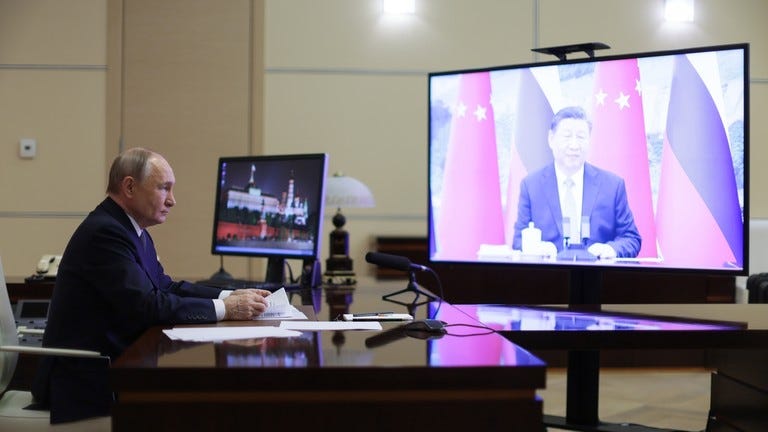
Murray Hunter
Xi pledges ‘new level’ in Russia-China relations
The countries will improve their partnership, which benefits their peoples and stabilizes the world, national leaders have said
Jan 21, 2025

Russian President Vladimir Putin and Chinese President Xi Jinping have reaffirmed the strength of the two nations’ strategic partnership in the face of external pressure, pledging to further improve ties during a traditional New Year video call on Tuesday.
Addressing each other as “dear friends,” Putin and Xi highlighted the benefits of the Russia-China partnership, which they praised as being rooted in respect and shared goals. Beijing hopes to bring the relationship with Moscow to a new level in 2025, standing together “against external uncertainty based on preservation of stability and resilience against stress,” the Chinese leader added.
Xi stressed the importance of maintaining “the UN-centric international system,” safeguarding the victory of World War II and protecting “the rights of China and Russia as UN founding countries and permanent members of the Security Council.”
Putin praised the growth of Russian trade with China, which reached an estimated $220-$245 billion in 2024, according to national statistics. He noted that last year Russia became the primary supplier of natural gas to China, thanks to the expansion of a strategic pipeline. Moscow and Beijing have also agreed to deepen their cooperation in nuclear energy, Putin added.
”We build our ties on the foundation of friendship, mutual trust and support, equality and mutual benefit,” the Russian leader said. He described the relationship as “self-sufficient and independent from domestic political factors and the current global situation.”
Putin and Xi had three face-to-face meetings last year, which took place in Beijing, Astana, and Kazan. They hold year-end video calls every January, sometime between the New Year celebrations in their respective nations.
China and Russia share stances on many global issues and are working together to promote a shift away from a Western-centric international order to a multipolar system. Both argue that their preferred approach would better serve less influential nations and foster greater global justice and equality.

Russian President Vladimir Putin and Chinese President Xi Jinping have reaffirmed the strength of the two nations’ strategic partnership in the face of external pressure, pledging to further improve ties during a traditional New Year video call on Tuesday.
Addressing each other as “dear friends,” Putin and Xi highlighted the benefits of the Russia-China partnership, which they praised as being rooted in respect and shared goals. Beijing hopes to bring the relationship with Moscow to a new level in 2025, standing together “against external uncertainty based on preservation of stability and resilience against stress,” the Chinese leader added.
Xi stressed the importance of maintaining “the UN-centric international system,” safeguarding the victory of World War II and protecting “the rights of China and Russia as UN founding countries and permanent members of the Security Council.”
Putin praised the growth of Russian trade with China, which reached an estimated $220-$245 billion in 2024, according to national statistics. He noted that last year Russia became the primary supplier of natural gas to China, thanks to the expansion of a strategic pipeline. Moscow and Beijing have also agreed to deepen their cooperation in nuclear energy, Putin added.
”We build our ties on the foundation of friendship, mutual trust and support, equality and mutual benefit,” the Russian leader said. He described the relationship as “self-sufficient and independent from domestic political factors and the current global situation.”
Putin and Xi had three face-to-face meetings last year, which took place in Beijing, Astana, and Kazan. They hold year-end video calls every January, sometime between the New Year celebrations in their respective nations.
China and Russia share stances on many global issues and are working together to promote a shift away from a Western-centric international order to a multipolar system. Both argue that their preferred approach would better serve less influential nations and foster greater global justice and equality.
No comments:
Post a Comment